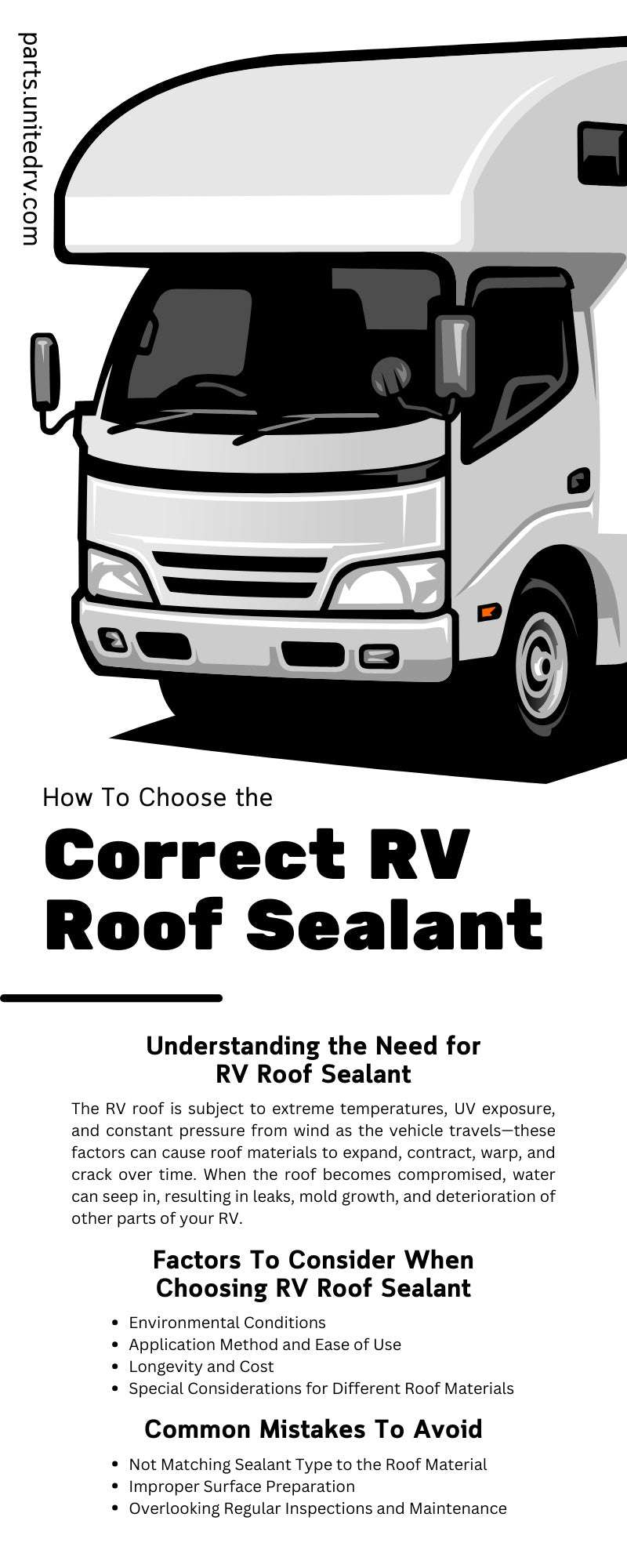How To Choose the Correct RV Roof Sealant

If you want to be able to take your RV out for several years to come, you must invest in protective measures—particularly for the roof. The RV roof, often neglected yet critical to the vehicle’s overall health, requires special care. Among the most important maintenance tasks is choosing and applying the correct roof sealant. In this detailed guide, we will walk you through how to choose the correct RV roof sealant.
Understanding the Need for RV Roof Sealant
Before we jump into the technicalities of different sealants, you should understand why applying sealant is necessary in the first place. The RV roof is subject to extreme temperatures, UV exposure, and constant pressure from wind as the vehicle travels—these factors can cause roof materials to expand, contract, warp, and crack over time. When the roof becomes compromised, water can seep in, resulting in leaks, mold growth, and deterioration of other parts of your RV. Fortunately, a quality sealant provides a protective barrier against these elements, preserving the RV’s structure and saving you hundreds of dollars in potential repairs.
Types of RV Roof Sealant
Now that you’re aware of why this investment is so crucial to your RV’s longevity and performance, let’s dive into some of your options. There are several types of sealants, each suited to different applications and budget constraints. Make sure that you find something strong that you can easily acquire more of if necessary. Below are some of the top choices.
Butyl Rubber Sealant Tape
This popular tape-style sealant is easy to apply and adheres well to most surfaces. It’s used for sealing joints and vents on RV roofs, as it remains pliable over time and is resistant to temperature extremes.
Pros
- Easy to use, especially for beginners
- Remains flexible, making it excellent for moving parts
Cons
- Not ideal for all roof types
- May require additional UV protection
Silicone Sealants
Silicone is also a popular option due to its long lifespan and excellent weather resistance. It’s great for nonporous surfaces and offers superior UV protection.
Pros
- Exceptional weather resistance
- Resists cracking and peeling
Cons
- Can be difficult to apply uniformly
- Typically more expensive
Acrylic Sealants
Acrylic sealants are water-based and have a good reputation for being environmentally friendly while offering good performance in low-stress areas of the roof.
Pros
- Easy to clean up with water
- Environmentally friendly
Cons
- Not as durable as silicone or butyl
- May not withstand extreme temperatures
Polyurethane Sealants
Polyurethane sealants are tough and durable, suitable for high-stress areas. They are excellent for use on a variety of materials.
Pros
- Great adhesion characteristics
- Can handle significant temperature fluctuations
Cons
- Can be tricky to work with due to fast curing times
- Not as forgiving as others if you make a mistake during application
EPDM (Ethylene Propylene Diene Monomer) Liquid Roof
EPDM roof coatings in liquid form are cost-effective and easy to apply to rubber roofs. They offer excellent resistance to pooling water, which can be the bane of a roof’s existence.
Pros
- Excellent resistance to standing water
- Can be applied with a roller for easy large-area coverage
Cons
- Can be cumbersome to apply to smaller, odd-shaped areas
- May require periodic touch-ups due to thinner applications
Factors To Consider When Choosing RV Roof Sealant
In this guide to choosing the correct RV roof sealant, we’ll also dive into some top things to consider as you shop around. When you’re ready to select a sealant, consider these important factors to ensure your choice is the right one for your specific RV.
Environmental Conditions
The climate where you’ll be using your RV will dramatically affect the performance of your sealant. If you’re in a region with extreme heat, UV-resistant sealants are a must. In cold climates, consider a sealant that stays flexible at low temperatures to prevent cracking.
Application Method and Ease of Use
Some sealants require specialized equipment or skills for application. Consider your own comfort with various techniques, and choose a sealant you’re confident applying. Remember, proper application is as critical as choosing the right product.
Longevity and Cost
Though high-quality sealants may cost more upfront, they often last longer and provide better protection. Consider your budget and the amount of time you are willing to invest in maintenance. A more durable sealant can save you money over time by delaying the need for replacement or repair.
Special Considerations for Different Roof Materials
Different types of RV roof materials will require different types of roof sealants. For example, EPDM requires a specific type of sealant that will not damage the rubber. Be sure to match the sealant to your roof material for the best results.
Common Mistakes To Avoid
Even with the best intentions, however, errors can occur during the application of roof sealant that can compromise its effectiveness. These are some top mistakes to steer clear of when making your final decision on a sealant product.
Not Matching Sealant Type to the Roof Material
Using the wrong type of sealant can lead to poor adhesion or, worse, damage to the roof material itself. Always confirm the compatibility of the sealant with your RV’s roof before application.
Improper Surface Preparation
Surface preparation is the most critical step in the sealing process. If you don’t clean or prep the surface correctly, the sealant won’t adhere properly and may fail.
Overlooking Regular Inspections and Maintenance
Applying sealant is not a one-and-done process. You must regularly inspect and touch it up as necessary to ensure continuing protection. Make a maintenance schedule and stick to it to avoid costly repairs.
Choosing the right RV roof sealant is not a decision to take lightly. It’s a critical aspect of maintaining your RV’s structural integrity and ensuring a comfortable living space. We encourage you to take the information here and make an informed decision when it comes to your sealant of choice.
If you’re looking for high-quality sealants that match your RV’s specific needs, United RV Center has just what you want. We carry a vast collection of RV roof seam sealer products designed to work with different types of roofs and accommodate varying environmental requirements. Check out our recommended products today to learn more about them. You can also give us a call so that our knowledgeable customer service representatives can help you narrow down your options.

